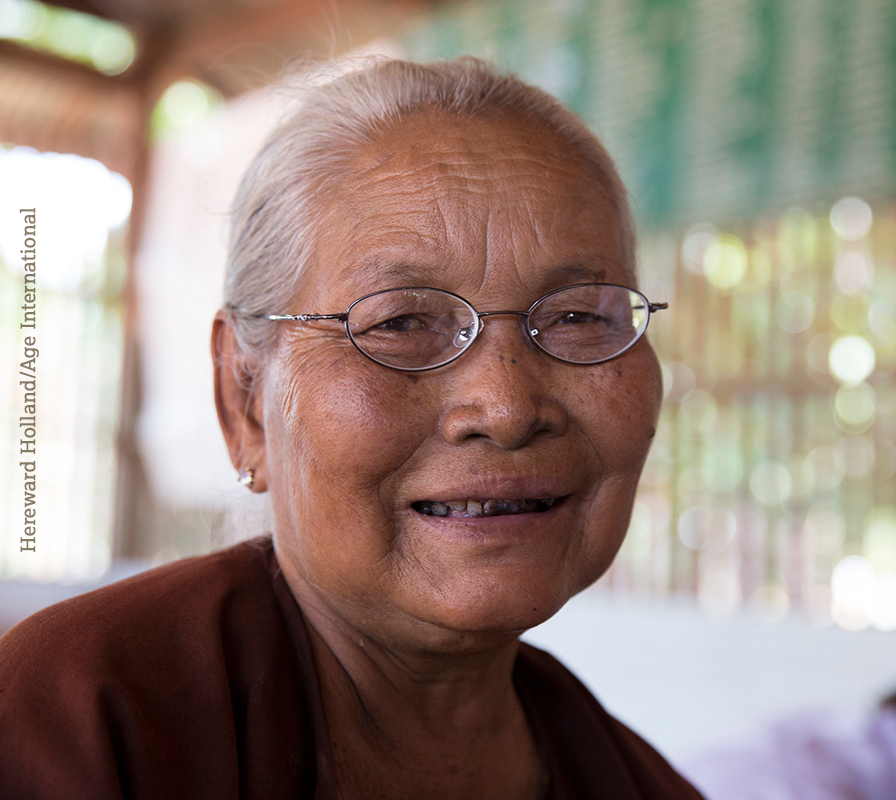Care needs of older people
While most older people are healthy and independent, some must learn to manage and live with chronic diseases or disabilities, and others have serious diseases or disabilities that require intensive care and support from others.
Care needs are not limited to individuals’ own needs though, as support may also be required to help care for disabled or ill partners. Older people are also taking on increasing responsibilities, for example care of children or ageing parents.
Older people tend to prefer to remain in their own homes and live close to children. However older people living in poverty may not be able to afford to live separately. This is more likely in towns and cities due to higher accommodation costs.
Some older people may not wish to ask for help, for example if their children are also living in poverty. Even if they do ask, their family may be unable to care for them.
Types of care
There is no one single solution for responding to the needs of older people although most older people prefer home care over residential care where possible. The goal is to keep older people as healthy and independent as possible so they can delay falling into greater dependency. The care options available are partly determined by the situation of each older person and the resources of each country.
- Family care: Many older people receive informal care from close relatives, such as a spouse or adult child. It usually occurs over a long period of time and may involve personal, social, health and financial support. Social support encompasses activities for activities of daily living (ADL), instrumental activities of daily living (IADL), emotional and psychosocial support.
- Home care: Some older people also need outside assistance with ADL or IADL to continue daily life at home. Visits from carers who help with this can include informal ‘neighbourly’ arrangements, formal volunteer programs such as home care, where carers may receive training and support, or professional care givers.
- Day or short term care: Day care or short term care can allow older people to either remain in their homes while receiving external care support or at an outside location. Occasionally day care may be offered as respite care, or to give family carers time off from caring duties, however this is still relatively rare in an Asian context.
- Residential and institutional care: Residential care and institutional care both refer to care provided within an institutional setting, usually a nursing home or care home and, less commonly, a hospital. The implication is that care is long-term.
Care in East Asia
Poverty is one of the most significant issues for older people in the region, and without access to pensions or free health care, many cannot afford the services they need. At the same time, rapid population ageing will exert unprecedented demand on existing care and health services. Countries are unlikely to be in a position to meet these needs without early and significant investment in infrastructure and services.
Family-based care is likely to decline due to changing family structure, labour force migration and increased female participation in the workforce. However there are opportunities to use existing structures and institutions, including local authorities, community based organisations and religious centres to develop community-based models of care.
Since 2003, most ASEAN member countries have been developing and adapting a Home Care Programme with support from HelpAge Korea and HelpAge International and funding from the Republic of Korea-ASEAN Cooperation Fund.
The project focuses on adapting the home care model according to the context of each country, and then implementing the country specific model via non-government partners. HelpAge International and HelpAge Korea provide conduct facilitation and capacity building activities with partner organisations, as well as supporting national governments to develop and replicate policies which facilitate greater care for older people.
Resources
HelpAge International, Community based home care for older people in South East Asia
HelpAge International, Home care for older people: The experience of ASEAN countries

